| Listing 1 - 10 of 18 | << page >> |
Sort by
|
Book
ISBN: 3476008363 Year: 1992 Volume: 28 Publisher: Stuttgart Metzler
Abstract | Keywords | Export | Availability | Bookmark
 Loading...
Loading...Choose an application
- Reference Manager
- EndNote
- RefWorks (Direct export to RefWorks)
Bachmann, Ingeborg --- Identity (Psychology) in literature --- Women in literature --- Identité (Psychologie) dans la littérature --- Femmes dans la littérature --- Bachmann, Ingeborg, --- Woman (Christian theology) in literature --- Women in drama --- Women in poetry --- Identité (Psychologie) dans la littérature --- Femmes dans la littérature
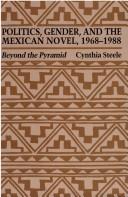
ISBN: 0292776616 9780292776616 Year: 1992 Publisher: Austin, Tex. University of Texas Press
Abstract | Keywords | Export | Availability | Bookmark
 Loading...
Loading...Choose an application
- Reference Manager
- EndNote
- RefWorks (Direct export to RefWorks)
Fiction --- Thematology --- Spanish-American literature --- anno 1980-1989 --- anno 1970-1979 --- Mexico --- Mexican fiction --- Politics in literature --- Sex role in literature --- Social problems in literature --- Women in literature --- Woman (Christian theology) in literature --- Women in drama --- Women in poetry --- Political science in literature --- History and criticism
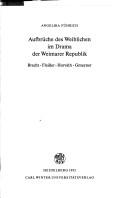
ISBN: 3533044947 Year: 1992 Publisher: Heidelberg Winter
Abstract | Keywords | Export | Availability | Bookmark
 Loading...
Loading...Choose an application
- Reference Manager
- EndNote
- RefWorks (Direct export to RefWorks)
German drama --- Literature and society --- Women in literature --- 830-2 "19" --- Woman (Christian theology) in literature --- Women in drama --- Women in poetry --- 830-2 "19" Duitse literatuur: toneel; drama--20e eeuw. Periode 1900-1999 --- Duitse literatuur: toneel; drama--20e eeuw. Periode 1900-1999 --- History and criticism --- Drama --- Horváth, von, Ödön --- Fleißer, Marieluise --- Brecht, Bertolt
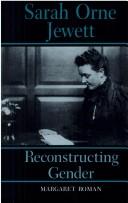
ISBN: 081739155X 0585228310 9780585228310 9780817391553 0817305335 9780817305338 Year: 1992 Publisher: Tuscaloosa University of Alabama Press
Abstract | Keywords | Export | Availability | Bookmark
 Loading...
Loading...Choose an application
- Reference Manager
- EndNote
- RefWorks (Direct export to RefWorks)
In her book Sarah Orne Jewett: Reconstructing Gender, Margaret Roman argues that one theme colors almost every short story and novel by the turn-of-the-century American author: each person, regardless of sex, must break free of the restrictive, polar-opposite norms of behavior traditionally assigned to men and women by a patriarchal society. That society, as seen from Jewett's perspective during the late Victorian era, was one in which a competitive, active man dominates a passive, emotional woman. Frequently referring to Jewett's own New England upbringing at the hands of an unusually progressive father, Roman demonstrates how the writer, through her personal quest for freedom and through the various characters she created, strove to eliminate the necessity for rigid and narrowly defined male-female roles and relationships. With the details of Jewett's free-spirited life, Roman's book represents a solid work of literary scholarship, which traces a gender-dissolving theme throughout Jewett's writing. Whereas previous critics have focused primarily on her best-known works, including "A White Heron," Deephaven, A Country Doctor, and The Country of the Pointed Firs, Roman encompasses within her own discussion virtually all of the stories found in the nineteen volumes Jewett published during her lifetime. And although much recent criticism has centered around Jewett's strong female characters, Roman is the first to explore in depth Jewett's male characters and married couples. The book progresses through distinct phases that roughly correspond to Jewett's psychological development as a writer. In general, the characters in her early works exhibit one of two modes of behavior. Youngsters, free as Jewett was to explore the natural world of woods and field, glimpse the possibility of escape from the confining standards that society has set, though some experience turbulent and confusing adolescences where those norms have become more pressing, more demanding. At the opposite extreme among these early characters are those who have mindlessly accepted the roles in which they have been trapped since youth--greedy, selfish men, dutiful women who tend emotionally empty houses, young couples unable to communicate either between themselves or with others--in short, characters who are too alienated within their roles to function as whole human beings. On the other hand, Jewett approaches the men and women of her later works with a higher degree of optimism, in that each person is free to live according to the dictates of his or her inherent personality--each character is able to measure life from within rather than from without. This group includes the self-confident men who are not reluctant to present a nurturing side and the warm, giving women who are unafraid of displaying a decided inner strength. As Roman summarizes, "In her writings, Jewett attempts to shift society's focus from a grasping power over people to the personal development of each member of society." Ahead of her time in many ways, Sarah Orne Jewett confronted the Victorian polarized gender system, presaging the modern view that men and women should be encouraged to develop along whatever paths are most comfortable and most natural for them.
Women and literature --- Gender identity in literature. --- Sex role in literature. --- Women in literature. --- Woman (Christian theology) in literature --- Women in drama --- Women in poetry --- Literature --- History --- Jewett, Sarah Orne, --- Criticism and interpretation. --- Maine --- District of Maine --- Maine (District) --- Maine (Province) --- Province of Maine --- Province of Maine of the Massachusetts Bay Colony --- State of Maine --- État du Maine --- Massachusetts --- In literature.
Book
ISBN: 3792306336 Year: 1992 Publisher: Münster : Regensberg,
Abstract | Keywords | Export | Availability | Bookmark
 Loading...
Loading...Choose an application
- Reference Manager
- EndNote
- RefWorks (Direct export to RefWorks)
Thematology --- Dutch literature --- Drama --- anno 1600-1699 --- Dutch drama (Comedy) --- Dutch drama --- Marriage in literature. --- Women in literature. --- History and criticism. --- 839.3-2 "16" --- -Dutch drama --- -Marriage in literature --- Women in literature --- Flemish drama --- Woman (Christian theology) in literature --- Women in drama --- Women in poetry --- Nederlandse literatuur: toneel; drama--17e eeuw. Periode 1600-1699 --- History and criticism --- 839.3-2 "16" Nederlandse literatuur: toneel; drama--17e eeuw. Periode 1600-1699 --- Marriage in literature
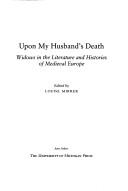
ISBN: 0472102575 9780472102570 Year: 1992 Publisher: Ann Arbor (Mich.) : University of Michigan press,
Abstract | Keywords | Export | Availability | Bookmark
 Loading...
Loading...Choose an application
- Reference Manager
- EndNote
- RefWorks (Direct export to RefWorks)
Widowhood --- Widows --- Women --- Women and literature --- History. --- Social conditions. --- History --- -Widows --- -Women --- -Women in literature --- -Woman (Christian theology) in literature --- Women in drama --- Women in poetry --- Human females --- Wimmin --- Woman --- Womon --- Womyn --- Females --- Human beings --- Femininity --- Marital status --- Life cycle, Human --- Social conditions --- -History --- Literature --- Widowhood - Europe - History. --- Widows - Europe - Social conditions. --- Women - History - Middle Ages, 500-1500. --- Women and literature - Europe - History - To 1500.
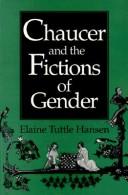
ISBN: 0520071336 0520074998 0585184321 Year: 1992 Publisher: Berkeley : University of California Press
Abstract | Keywords | Export | Availability | Bookmark
 Loading...
Loading...Choose an application
- Reference Manager
- EndNote
- RefWorks (Direct export to RefWorks)
Feminism and literature --- Women and literature --- Sex role in literature --- Women in literature --- English --- Languages & Literatures --- English Literature --- History --- Woman (Christian theology) in literature --- Women in drama --- Women in poetry --- Literature --- Women authors --- Chaucer, Geoffrey, --- Chaucer, Jeffrey, --- Chʻiao-sou, Chieh-fu-lei, --- Chieh-fu-lei Chʻiao-sou, --- Choser, Dzheffri, --- Choser, Zheoffreĭ, --- Cosvr, Jvoffrvi, --- Tishūsar, Zhiyūfrī, --- Characters --- Women. --- Literature and feminism --- Sex role in literature. --- Women in literature.

ISBN: 0817305335 Year: 1992 Publisher: Tuscaloosa London University of Alabama Press
Abstract | Keywords | Export | Availability | Bookmark
 Loading...
Loading...Choose an application
- Reference Manager
- EndNote
- RefWorks (Direct export to RefWorks)
Femme (Théologie chrétienne) dans la littérature --- Femmes dans la littérature --- Femmes dans la poésie --- Femmes dans le théâtre --- Rôle selon le sexe dans la littérature --- Seksuele rolpatronen in de literatuur --- Sex role in literature --- Vrouw (Christelijke theologie) in de literatuur --- Vrouwen in de literatuur --- Vrouwen in de poëzie --- Vrouwen in het toneel --- Woman (Christian theology) in literature --- Women in drama --- Women in literature --- Women in poetry --- Jewett, Sarah Orne --- Criticism and interpretation
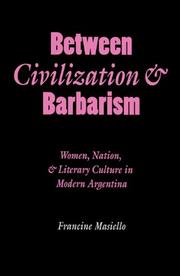
ISBN: 058502135X 9780585021355 080323158X 9780803231580 Year: 1992 Publisher: Lincoln University of Nebraska Press
Abstract | Keywords | Export | Availability | Bookmark
 Loading...
Loading...Choose an application
- Reference Manager
- EndNote
- RefWorks (Direct export to RefWorks)
Argentine literature --- Women --- Literature and society --- Women and literature --- Women in literature --- Romance Literatures --- Languages & Literatures --- Spanish Literature --- Woman (Christian theology) in literature --- Women in drama --- Women in poetry --- Literature --- Literature and sociology --- Society and literature --- Sociology and literature --- Sociolinguistics --- Feminism --- Women authors --- History and criticism. --- Social conditions --- Social aspects --- Argentina --- Intellectual life. --- Sociology of literature --- Spanish-American literature --- anno 1800-1999 --- Literature and society. --- Women and literature. --- Women in literature. --- Social conditions.
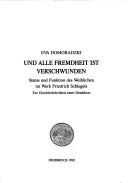
ISBN: 3851241533 9783851241532 Year: 1992 Volume: 82 Publisher: Innsbruck: Universität Innsbruck. Institut für Sprachwissenschaft,
Abstract | Keywords | Export | Availability | Bookmark
 Loading...
Loading...Choose an application
- Reference Manager
- EndNote
- RefWorks (Direct export to RefWorks)
Death --- Funeral rites and ceremonies --- -Women in literature --- Woman (Christian theology) in literature --- Women in drama --- Women in poetry --- Funerals --- Mortuary ceremonies --- Obsequies --- Manners and customs --- Rites and ceremonies --- Burial --- Cremation --- Dead --- Mourning customs --- Dying --- End of life --- Life --- Terminal care --- Terminally ill --- Thanatology --- History --- -Philosophy --- Schlegel, Friedrich von --- -Knowledge --- -Women --- Tyrol (Austria) --- -Religious life and customs --- -Schlegel, Friedrich von --- Vrouwelijkheid (Filosofie) --- -Tirol (Austria) --- Tirolo (Austria) --- Osttirol (Austria) --- Religious life and customs --- Women in literature. --- Death. --- Mortality --- Cryomation --- Funeral rites and ceremonies - Austria - Tyrol - History - 19th century.
| Listing 1 - 10 of 18 | << page >> |
Sort by
|

 Search
Search Feedback
Feedback About UniCat
About UniCat  Help
Help News
News